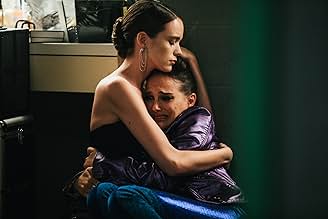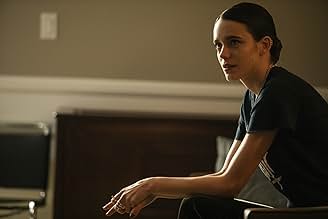PUNTUACIÓN EN IMDb
5,9/10
21 mil
TU PUNTUACIÓN
Un conjunto de circunstancias inesperadas otorga un éxito inesperado a una estrella del pop.Un conjunto de circunstancias inesperadas otorga un éxito inesperado a una estrella del pop.Un conjunto de circunstancias inesperadas otorga un éxito inesperado a una estrella del pop.
- Dirección
- Guión
- Reparto principal
- Premios
- 1 premio y 11 nominaciones en total
Micheál Neeson
- The Musician
- (as Micheál Richardson)
Reseñas destacadas
The reviews and trailer for this film promised a strong performance by Natalie Portman as a troubled pop star. While some of the praise for her role in "Vox Lux" may be somewhat overhyped, she does give a generally good performance in this drama directed by Brady Corbet. She plays Celeste, a now-famous pop star who survived a school shooting in 1999. The film gives viewers a grip on how those who get too all-consumed in the superficiality of pop music culture can lose control over their lives, although sometimes the dialogue and writing during these scenes can sometimes feel almost too on-the-nose to be truly impactful on the viewer.
The film is stunningly shot, and its score is often stirring and potent. Jude Law's supporting performance is outstanding, providing a powerfully subdued complement to the main narrative as Celeste's manager. With the exception of the memorial song sung by a young Celeste at a vigil for the shooting victims about ten minutes after film's commencement, the rest of the film's songs (which are pop-based) are generally not too appealing. However, this is likely intentional, as Corbet's direction is intended to make the viewer critique popular culture and its effects on music and society, as well as the possibility that our social obsessions may breed tragic and wretched acts. Despite such potentially-thoughtful commentary, it's not clear by the end of the film what Corbet really wants to say or offer as a message to the narrative besides simply saying that excess tackiness is bad. While superficiality is an important topic, for a film that poses far deeper, existential and angst-filled questions, the film's attempts to thread loose ends of its messaging before the film's finale (a pop concert) feel somewhat skimpy. The film's stronger elements would make it worth of recommending to those who like Natalie Portman and can appreciate sometimes-audacious and challenging films. 7/10
The film is stunningly shot, and its score is often stirring and potent. Jude Law's supporting performance is outstanding, providing a powerfully subdued complement to the main narrative as Celeste's manager. With the exception of the memorial song sung by a young Celeste at a vigil for the shooting victims about ten minutes after film's commencement, the rest of the film's songs (which are pop-based) are generally not too appealing. However, this is likely intentional, as Corbet's direction is intended to make the viewer critique popular culture and its effects on music and society, as well as the possibility that our social obsessions may breed tragic and wretched acts. Despite such potentially-thoughtful commentary, it's not clear by the end of the film what Corbet really wants to say or offer as a message to the narrative besides simply saying that excess tackiness is bad. While superficiality is an important topic, for a film that poses far deeper, existential and angst-filled questions, the film's attempts to thread loose ends of its messaging before the film's finale (a pop concert) feel somewhat skimpy. The film's stronger elements would make it worth of recommending to those who like Natalie Portman and can appreciate sometimes-audacious and challenging films. 7/10
The sophomore effort from actor turned director (boy is this becoming a trend) Brady Corbet is dying to be inventive. The ambition to break conventions certainly plays as charming, but in the "look at the adorable child ad libbing this karaoke song" brand of charming. His experimenting begins early on with half of the end credits appearing over a long shot documenting a static scene of our protagonist bathing in the tragedy that will ignite the jumpy life events shown later. This is only a couple scenes deep into the movie, and it is also ineffective (partially because there's no apparent intended effect). Even so, this quirk remains the most forgivable of Corbet's decisions.
The voice of Willem Dafoe acts as a Virgil figure narrating Celeste's (Natalie Portman) fortunate misfortunes that led to her pop stardom. Celeste's crucible event occurs in a middle school classroom with musical notations plastered all over the walls. She sits attentive and diligent, eager to be trained by her clarinet-totting teacher. A boy adorned in glam mascara and eclipsed eyes enters, interrupting the roll call with more than words. What follows has been labelled as "birth" by a handy title screen demarcating the film's Act One. Divided into a prologue, two acts, and a finale, we're hardly treated to an essential utilization of the segmented narrative that filmmakers such as Lars von Trier have perfected.
Teenage Celeste is played by the rather mechanical Raffey Cassidy, who also plays (drum roll, kind sir) Celeste's daughter Albertine. This would initially appear as rather cunning way of allowing a substance-dependent adult Celeste to be maternally reminded of her squandered youth and innocence, however, the film makes no effort to support this surrealist reading. In fact it has the gumption to re-use yet another actress once the timeline shifts from 1999 to 2017. Eleanor, Celeste's older sister, is played by the less rigid Stacy Martin both as a teen and a 30 plus year old adult. To recap: Celeste gets to hop into a Natalie Portman body after 18 years, but Eleanor stays put. Much credit to Martin here for differentiating teen from adult in tastefully understated ways; the growth and grime that Celeste shoves her through shines through as adult Eleanor withstands verbal barrages one moment, then caresses her tormentor sister's head backstage in the next.
The young sisters compose a song to perform at a prayer vigil being held for the community torn asunder by the act of evil that has placed Celeste in a neck brace, an accessory that will change into scarfs and chokers as her fame blossoms. Eleanor deserves total writing credits, but Celeste is the one being wheeled out onto the church's stage. Local news recording the vigil cracks open the lid of possibilities, and the sisters have an anthem on their hands once they adjust the lyrics changing "the I's to we's". Immediately (and I mean immediately; no transition) the girls are led into a recording studio by The Manager (Jude Law). This is actually how he is credited, signifying how one-minded he acts in relation to Celeste. He uses all means necessary to build and maintain Celeste's pop royalty. Celeste's father appear once, and his face is obscured nailing in the reality of no parental nurture available to the budding star.
Her legal guardianship is ultimately pushed onto Eleanor, who will also take on that role for Celeste's own daughter. The film plants this as one of several consequences when one decides to sell their image. This act of self-marketing is compared curiously to radical nihilism with Dafoe decoding the film's intent over well executed camcorder montage footage implemented to advance the sister's slide into a vicious cycle of reliance upon one another. Celeste is nothing without Eleanor, completely unstable without her caring touch and intimate knowledge of her sister's greatest curse. Eleanor, however, is entirely supported financially by her hollow sister, and Albertine might be the only daughter she may ever have. All of Eleanor's talent and wisdom isn't stolen by Celeste, but given away freely. Reminiscent of the documentary Whitney revealing the relentless blood pact within the Houston family, the sister's entanglement carries the emotional heft of a film that otherwise blindly stabs at shocking imagery.
I will briefly mention an intriguing reading introduced by the narrator in the film's closing minutes. Without giving any detail, it's one of those scapegoat twilight revelations that can give Corbet an out for some of the issues I have expressed here. Strangely enough, I am grateful for this bit of spice for it allows the mind to wonder, combing through all the previous events. You're encouraged to view them with a surrealist lens, and some devious theory might pop up. This by no means corrects all the prior flaws, but it does allow you to imagine a better film within the otherwise static one that was ultimately delivered. Special mention to the pop songs crafted for Celeste by Sia, providing the vapid lyrical representation of a genre designed "to make people feel happy". What is unknown is that these hit-makers are far from happy.
The voice of Willem Dafoe acts as a Virgil figure narrating Celeste's (Natalie Portman) fortunate misfortunes that led to her pop stardom. Celeste's crucible event occurs in a middle school classroom with musical notations plastered all over the walls. She sits attentive and diligent, eager to be trained by her clarinet-totting teacher. A boy adorned in glam mascara and eclipsed eyes enters, interrupting the roll call with more than words. What follows has been labelled as "birth" by a handy title screen demarcating the film's Act One. Divided into a prologue, two acts, and a finale, we're hardly treated to an essential utilization of the segmented narrative that filmmakers such as Lars von Trier have perfected.
Teenage Celeste is played by the rather mechanical Raffey Cassidy, who also plays (drum roll, kind sir) Celeste's daughter Albertine. This would initially appear as rather cunning way of allowing a substance-dependent adult Celeste to be maternally reminded of her squandered youth and innocence, however, the film makes no effort to support this surrealist reading. In fact it has the gumption to re-use yet another actress once the timeline shifts from 1999 to 2017. Eleanor, Celeste's older sister, is played by the less rigid Stacy Martin both as a teen and a 30 plus year old adult. To recap: Celeste gets to hop into a Natalie Portman body after 18 years, but Eleanor stays put. Much credit to Martin here for differentiating teen from adult in tastefully understated ways; the growth and grime that Celeste shoves her through shines through as adult Eleanor withstands verbal barrages one moment, then caresses her tormentor sister's head backstage in the next.
The young sisters compose a song to perform at a prayer vigil being held for the community torn asunder by the act of evil that has placed Celeste in a neck brace, an accessory that will change into scarfs and chokers as her fame blossoms. Eleanor deserves total writing credits, but Celeste is the one being wheeled out onto the church's stage. Local news recording the vigil cracks open the lid of possibilities, and the sisters have an anthem on their hands once they adjust the lyrics changing "the I's to we's". Immediately (and I mean immediately; no transition) the girls are led into a recording studio by The Manager (Jude Law). This is actually how he is credited, signifying how one-minded he acts in relation to Celeste. He uses all means necessary to build and maintain Celeste's pop royalty. Celeste's father appear once, and his face is obscured nailing in the reality of no parental nurture available to the budding star.
Her legal guardianship is ultimately pushed onto Eleanor, who will also take on that role for Celeste's own daughter. The film plants this as one of several consequences when one decides to sell their image. This act of self-marketing is compared curiously to radical nihilism with Dafoe decoding the film's intent over well executed camcorder montage footage implemented to advance the sister's slide into a vicious cycle of reliance upon one another. Celeste is nothing without Eleanor, completely unstable without her caring touch and intimate knowledge of her sister's greatest curse. Eleanor, however, is entirely supported financially by her hollow sister, and Albertine might be the only daughter she may ever have. All of Eleanor's talent and wisdom isn't stolen by Celeste, but given away freely. Reminiscent of the documentary Whitney revealing the relentless blood pact within the Houston family, the sister's entanglement carries the emotional heft of a film that otherwise blindly stabs at shocking imagery.
I will briefly mention an intriguing reading introduced by the narrator in the film's closing minutes. Without giving any detail, it's one of those scapegoat twilight revelations that can give Corbet an out for some of the issues I have expressed here. Strangely enough, I am grateful for this bit of spice for it allows the mind to wonder, combing through all the previous events. You're encouraged to view them with a surrealist lens, and some devious theory might pop up. This by no means corrects all the prior flaws, but it does allow you to imagine a better film within the otherwise static one that was ultimately delivered. Special mention to the pop songs crafted for Celeste by Sia, providing the vapid lyrical representation of a genre designed "to make people feel happy". What is unknown is that these hit-makers are far from happy.
Especially when it comes through being a literal survivor of a despicable act - something I had no idea was going to happen, but sets quite the mood for the movie. We have different stages here and this might work as a good double bill to a documentary called "F... Fame". Well I don't think I have to spell the F word out for you to understand.
This works as criticism about how society views celebrities, fame and how this might change everyone involved. But it is quite slow in its pace and it is rather subtle in its message too. So while the performances might seem over the top at times, that does not go for the understanding of the movie or what it represents. Which might and will feel frustrating to watch for quite a few people - I'm split too on my verdict as you can see. Can't blame the actors who really do their best
This works as criticism about how society views celebrities, fame and how this might change everyone involved. But it is quite slow in its pace and it is rather subtle in its message too. So while the performances might seem over the top at times, that does not go for the understanding of the movie or what it represents. Which might and will feel frustrating to watch for quite a few people - I'm split too on my verdict as you can see. Can't blame the actors who really do their best
Natalie Portman stars in this very unusual, intriguing but flawed film that explores several different genres in tackling pop culture and its sordid grip on the national consciousness at the dawn of the new millennium. Is this a satirical bombardment? One could argue. Is it a tragic indictment? Definite possibility. One thing it is not is straightforward.
This film gets by on the strength of its performances and its committed portrayal of the poisonous celebrity lifestyle and the emotional toll it exacts. Portman is explosive as the grown-up pop star who came from humble beginnings and found her survival of a horrific school shooting catapulting her into national prominence when she performed a song at a televised vigil. Jude Law is sharp as her gruff, street-smart manager who early on helps transform her from a victim of tragedy into a gaudy, commercialized monstrosity. Raffey Cassidy shines in dual roles as the pop starlet in her younger days, and as her teenage daughter in the film's second half.
There are drawbacks. A dry, detached voiceover narration by Willem Dafoe is more often a glaring distraction than an enhancement. And the film's simplistic juxtaposition of acts of terrorism and concert tours only tentatively conveys the theme of the intertwining of tragedy and pop culture. The film is obviously trying to echo its plot thread that takes hold in the beginning but it seems so faint by comparison.
Thought-provoking but more for the thesis that it tackles than for its actual achievement, this film is worth watching. How well it succeeds depends on how you view Portman's performance. Does she eviscerate the entertainment industry as immoral with a lightning-rod portrayal of wasted youth? Or does she dilute the film's impact by giving a performance that is too much of a caricature to constitute an allegory? Decide for yourself.
I freely admit that this film is not for everyone while acknowledging that I myself found it quite compelling. Finally, a splendid array of well-performed songs and a sterling soundtrack add to the film's favor. Recommended.
This film gets by on the strength of its performances and its committed portrayal of the poisonous celebrity lifestyle and the emotional toll it exacts. Portman is explosive as the grown-up pop star who came from humble beginnings and found her survival of a horrific school shooting catapulting her into national prominence when she performed a song at a televised vigil. Jude Law is sharp as her gruff, street-smart manager who early on helps transform her from a victim of tragedy into a gaudy, commercialized monstrosity. Raffey Cassidy shines in dual roles as the pop starlet in her younger days, and as her teenage daughter in the film's second half.
There are drawbacks. A dry, detached voiceover narration by Willem Dafoe is more often a glaring distraction than an enhancement. And the film's simplistic juxtaposition of acts of terrorism and concert tours only tentatively conveys the theme of the intertwining of tragedy and pop culture. The film is obviously trying to echo its plot thread that takes hold in the beginning but it seems so faint by comparison.
Thought-provoking but more for the thesis that it tackles than for its actual achievement, this film is worth watching. How well it succeeds depends on how you view Portman's performance. Does she eviscerate the entertainment industry as immoral with a lightning-rod portrayal of wasted youth? Or does she dilute the film's impact by giving a performance that is too much of a caricature to constitute an allegory? Decide for yourself.
I freely admit that this film is not for everyone while acknowledging that I myself found it quite compelling. Finally, a splendid array of well-performed songs and a sterling soundtrack add to the film's favor. Recommended.
You will think Vox Lux would be about the perils of pop music. It starts off with a horrifying school shooting.
13 year old Celeste Montgomery (Raffey Cassidy) survives but is shot in the neck. At an event held to remember the victims, Celeste sings a song that she co-wrote with her older sister Ellie. It becomes a hit and Celeste gets picked up by a pop manager as she encounters instant fame.
The second part of the film concentrates on the adult Celeste (Natalie Portman) in 2017. She is a jaded unhinged pop diva. Cynical and hard as nails who has encountered booze, drugs and infamy. Celeste actually lost her vision in one eye while drinking cleaning fluids. She was involved in a multi million dollar lawsuit as she ran over a man and then was racially abusive towards him.
Celeste is about to start a tour to promote her new album. Her daughter Albertine (Raffey Cassidy) who has been raised by Ellie has recently lost her virginity. Celeste becomes unsteady and incoherent with booze, her daughter's sexual experience and a terrorist attack in Croatia which might be linked to her music. At one point it looks like Celeste is in no fit state to perform at the concert.
Vox Lux is deliberately episodic in structure and never joins up properly. The caustic narration by Willem Dafoe paints the movie as a warning of the corrosive effects of stardom. Celeste has long ceased to be a real person. The ending at a pop concert feels strangely muted, sudden and unsatisfying. Portman excels as Celeste just as Cassidy who plays dual roles but the film has nothing new to say.
13 year old Celeste Montgomery (Raffey Cassidy) survives but is shot in the neck. At an event held to remember the victims, Celeste sings a song that she co-wrote with her older sister Ellie. It becomes a hit and Celeste gets picked up by a pop manager as she encounters instant fame.
The second part of the film concentrates on the adult Celeste (Natalie Portman) in 2017. She is a jaded unhinged pop diva. Cynical and hard as nails who has encountered booze, drugs and infamy. Celeste actually lost her vision in one eye while drinking cleaning fluids. She was involved in a multi million dollar lawsuit as she ran over a man and then was racially abusive towards him.
Celeste is about to start a tour to promote her new album. Her daughter Albertine (Raffey Cassidy) who has been raised by Ellie has recently lost her virginity. Celeste becomes unsteady and incoherent with booze, her daughter's sexual experience and a terrorist attack in Croatia which might be linked to her music. At one point it looks like Celeste is in no fit state to perform at the concert.
Vox Lux is deliberately episodic in structure and never joins up properly. The caustic narration by Willem Dafoe paints the movie as a warning of the corrosive effects of stardom. Celeste has long ceased to be a real person. The ending at a pop concert feels strangely muted, sudden and unsatisfying. Portman excels as Celeste just as Cassidy who plays dual roles but the film has nothing new to say.
How Natalie Portman Created Chemistry in 'Vox Lux'
How Natalie Portman Created Chemistry in 'Vox Lux'
Natalie Portman and her Vox Lux co-star Raffey Cassidy discuss playing the same complex character and how they created chemistry with director Brady Corbet.
¿Sabías que...?
- CuriosidadesNatalie Portman shot her part in only 10 days.
- PifiasDuring the sequence showing the road to Stockholm airport, multiple cars made after 2000 (the year that scene is supposed to be set) are visible.
- Citas
Young Celeste: That's what I love about pop music. I don't want people to have to think too hard. I just want them to feel good.
- Créditos adicionalesEnd credits roll downwards which only include post-production credits, score and music credits and business credits.
- Banda sonoraMistress Mary
Traditional
Selecciones populares
Inicia sesión para calificar y añadir a tu lista para recibir recomendaciones personalizadas
- How long is Vox Lux?Con tecnología de Alexa
Detalles
Taquilla
- Presupuesto
- 11.000.000 US$ (estimación)
- Recaudación en Estados Unidos y Canadá
- 727.119 US$
- Fin de semana de estreno en EE. UU. y Canadá
- 155.714 US$
- 9 dic 2018
- Recaudación en todo el mundo
- 1.444.547 US$
- Duración
- 1h 54min(114 min)
- Color
- Relación de aspecto
- 1.66 : 1
Contribuir a esta página
Sugerir un cambio o añadir el contenido que falta











































